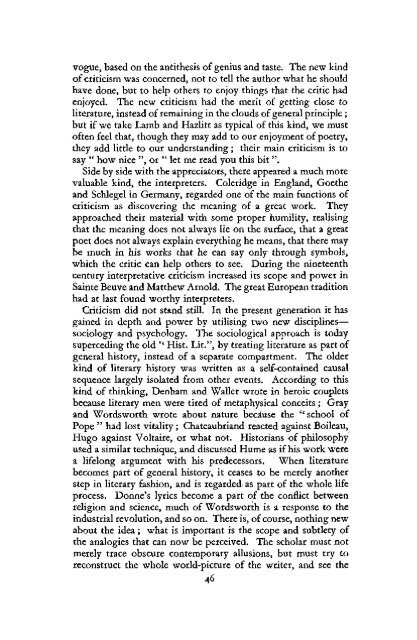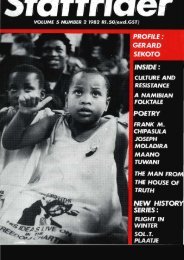Theoria - DISA
Theoria - DISA
Theoria - DISA
Create successful ePaper yourself
Turn your PDF publications into a flip-book with our unique Google optimized e-Paper software.
vogue, based on the antithesis of genius and taste. The new kind<br />
of criticism was concerned, not to tell the author what he should<br />
have done, but to help others to enjoy things that the critic had<br />
enjoyed. The new criticism had the merit of getting close to<br />
literature, instead of remaining in the clouds of general principle ;<br />
but if we take Lamb and Hazlitt as typical of this kind, we must<br />
often feel that, though they may add to our enjoyment of poetry,<br />
they add little to our understanding; their main criticism is to<br />
say " how nice ", or " let me read you this bit".<br />
Side by side with the appreciators, there appeared a much more<br />
valuable kind, the interpreters. Coleridge in England, Goethe<br />
and Schlegel in Germany, regarded one of the main functions of<br />
criticism as discovering the meaning of a great work. They<br />
approached their material with some proper humility, realising<br />
that the meaning does not always lie on the surface, that a great<br />
poet does not always explain everything he means, that there may<br />
be much in his works that he can say only through symbols,<br />
which the critic can help others to see. During the nineteenth<br />
century interpretative criticism increased its scope and power in<br />
Sainte Beuve and Matthew Arnold. The great European tradition<br />
had at last found worthy interpreters.<br />
Criticism did not stand still. In the present generation it has<br />
gained in depth and power by utilising two new disciplines—••<br />
sociology and psychology. The sociological approach is today<br />
superceding the old " Hist. Lit.", by treating literature as part of<br />
general history, instead of a separate compartment. The older<br />
kind of literary history was written as a self-contained causal<br />
sequence largely isolated from other events. According to this<br />
kind of thinking, Denham and Waller wrote in heroic couplets<br />
because literary men were tired of metaphysical conceits ; Gray<br />
and Wordsworth wrote about nature because the '' school of<br />
Pope " had lost vitality; Chateauhriand reacted against Boileau,<br />
Hugo against Voltaire, or what not. Historians of philosophy<br />
used a similar technique, and discussed Hume as if his work were<br />
a lifelong argument with his predecessors. When literature<br />
becomes part of general history, it ceases to be merely another<br />
step in literary fashion, and is regarded- as part of the whole life<br />
process. Donne's lyrics become a part of the conflict between<br />
religion and science, much of Wordsworth is a response to the<br />
industrial revolution, and so on. There is, of course, nothing new<br />
about the idea; what is important is the scope and subtlety of<br />
the analogies that can now be perceived. The scholar must not<br />
merely trace obscure contemporary allusions, but must try to<br />
reconstruct the whole world-picture of the writer, and see the<br />
46
















